Pro-Iran Militias Warn Of Forceful Response after Israeli Strike In Syria
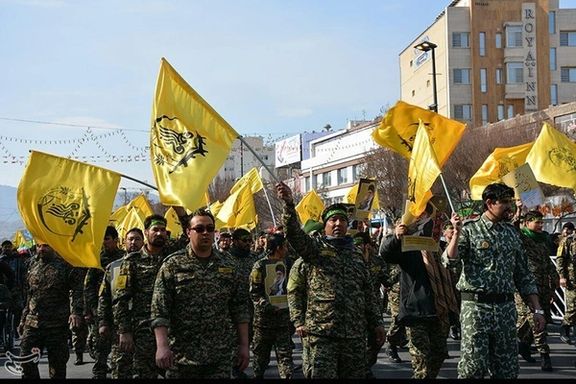
Iran-backed forces in Syria said on Thursday they would respond forcefully to an Israeli strike on Wednesday evening in the second such strike within a week.

Iran-backed forces in Syria said on Thursday they would respond forcefully to an Israeli strike on Wednesday evening in the second such strike within a week.
The Syrian defense ministry said in a statement that one soldier was killed in the attack that took place at 11:34 p.m. (2034 GMT) and targeted a communications tower and caused some material losses near Palmyra.
Israel has kept silent about the strikes that came days after another attack in the Homs countryside, wounded six Syrian soldiers.
Israel since 2017 has been mounting attacks on what it has described as Iranian-linked targets in Syria, where Tehran-backed forces including Lebanon's Hezbollah have put down a presence since deploying to help President Bashar al-Assad in the Syrian conflict that erupted in 2011.
A statement by the so-called operations room of Assad's Iran-backed allies said the response to the strike would be "very cruel", adding casualties would have been much higher had its forces not been well spread across the desert area.
"As a result of this attack a number of martyrs and injured from our Mujahedeen brothers have fallen," the statement said without elaborating.
"We have taken a decision to respond to this attack in revenge for the martyrs and the blood of the injured and the response will be very cruel," said the statement.
A senior military source who requested anonymity said the strikes hit among other targets the T4 air base where Iran-backed militias launched drone strikes in recent months against US bases in northern Syria.
The Palmyra area where the strikes were conducted are close to a major concentration of Russian bases and where its troops conducted in recent days maneuvers with Syrian troops, military experts say.
Israel wants Iranian and Iran-backed forces kept away from its border and more broadly, removed from Syria entirely.
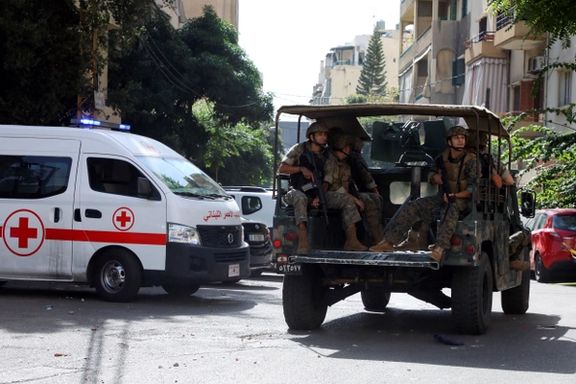
At least two people were killed in Beirut on Thursday when heavy gunfire targeted supporters of the Shi'ite group Hezbollah, as they headed to a protest demanding the removal of the judge investigating last year's explosion at the city's port.
The shooting on a frontline of the 1975-90 civil war marks some of Lebanon's worst civil strife in years, and highlights a deepening political crisis over the probe into the catastrophic Aug. 4, 2020 blast.
The Lebanese army said in a statement the gunfire had targeted protesters as they passed through a traffic circle located in an area dividing Christian and Shi'ite Muslim neighborhoods.
As Prime Minister Najib Mikati called for calm, a military source told Reuters two people had been killed and seven more wounded.
The shooting began from the Christian neighborhood of Ain el-Remmaneh before spiraling into an exchange of fire, the source added.
Hezbollah's al-Manar TV said "two martyrs" and a number of wounded had been taken to a hospital in the Shi'ite southern suburbs, indicating that the casualties were Shi'ites.
Bursts of gunfire were heard for several hours, along with several explosions which appeared to be rocket propelled-grenades fired into the air, Reuters witnesses said.
The Lebanese army deployed heavily in the area and said it would open fire against any armed person on the road.
Political tensions over the probe into the port explosion have been building, with the heavily armed, Iran-backed Hezbollah leading calls for Bitar's removal, accusing him of bias.
The explosion killed more than 200 people and devastated swathes of Beirut.
The judge has sought to question a number of senior politicians and security officials, including Hezbollah allies, suspected of negligence that led to the port explosion, which caused by a huge quantity of ammonium nitrate.
All have denied wrongdoing.
Though none of its members have been targeted by the probe, the heavily armed, Iran-backed Hezbollah has accused Bitar of conducting a politicized probe only focused on certain people.
These include some of its closest allies, among them senior figures in the Shi'ite Amal Movement who occupied ministerial posts.
A court earlier on Thursday dismissed a legal complaint against the Bitar, documents showed - allowing him to resume his investigation.
On Wednesday, Samir Geagea, a Christian opponent of Hezbollah, rejected what he described as any submission to "intimidation" by the group, calling on Lebanese to be ready for peaceful strike action if the "other side" tried to impose its will by force.
Reporting by Reuters
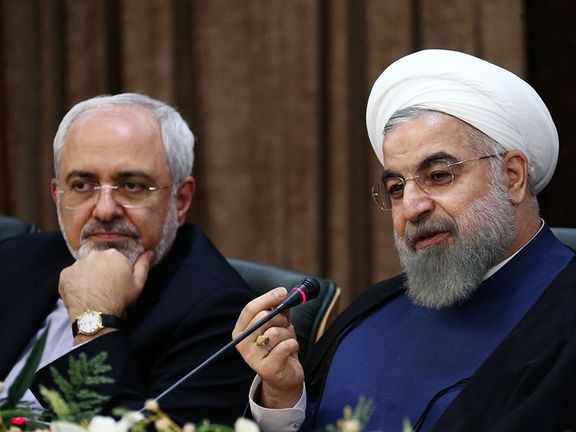
Iran's hardliners appear to be zeroing in on former President Hassan Rouhani and his officials in a bid to blame them for the country's long-standing problems.
Former foreign Minister Mohammad Javad Zarif and Rouhani’s Communication and ICT Minister Mohammad Javad Azari Jahromi are also targets for hardliners who want to find scapegoats for the country's economic, foreign policy and social problems.
The attempt to put Rouhani and his ministers on trial, as the Majles has been calling it, could also be a cover to divert attention from Supreme Leader Ali Khamenei who is the man making nearly all decisions relating to the affairs of the state without assuming responsibility when his policies go wrong.
Iran has faced various degrees of isolation during Khamenei’s 32-year rule and has faced sanctions because of his policies opposing the United States, Israel and the West in general.
On October 7, Mohammad Hossein Asafari, the deputy chairman of the Iranian parliament's Interior Affairs Committee called for putting Rouhani and Zarif on trial and blamed them for the failure in nuclear negotiations in Vienna to revive the 2015 nuclear deal with world powers.
Asafari even accused Zarif of signing the deal also called the JCPOA (Joint Comprehensive Plan of Action) without having read it first. He said the Rouhani administration should have sought guarantees from the US to stand by its promises under the JCPOA.
Despite denials by Zarif, Asafari charged that Zarif has allegedly "confessed" that he did not know about the terms of the deal. He said: "All the evidence available indicate that the failure of the talks is due to the negligence of the negotiating team led by Zarif."
Subsequently, another influential lawmaker told the media that a legal case has been made against Zarif and Rouhani. Hassan Shojaee said that the committee has received a petition signed by more than 500,000 individuals who demanded Rouhani's trial.
According to Shojaee, the charges against Rouhani include, "not doing anything about rising [foreign currency] rates, devaluation of national currency and destruction of people's assets, giving key jobs to spies and dual nationals, and failing to tackle the rising death toll as the coronavirus pandemic raged on." Rouhani is being blamed for the pandemic toll, while it was Khamenei who banned the purchase of American and British vaccines in January.
Reformist daily Sharq has described the initiatives taken by the Majles against Rouhani and his ministers as an attempt to settle scores now when he is out of power and unable to respond to charges like before. Sharq said the hardliners treat Rouhani in a way as if mudslinging is their only solution in the face of the country's problems.
In another development, the Iranian Judiciary has announced that former Communication and ITC minister Jahromi is free on bail and might be called to court to stand trial or even go to jail. He has been a target for hardliners who accuse him of not pursuing more internet censorship, specially blocking popular social media apps.
Recently, Jahromi once again opposed parliament's plan to ban or radically restrict all social media, while hardliner lawmakers, including former ultraconservative Paydari Party leader Morteza Agha Tehrani, said that they would further the plan even all 80 million Iranians oppose it.
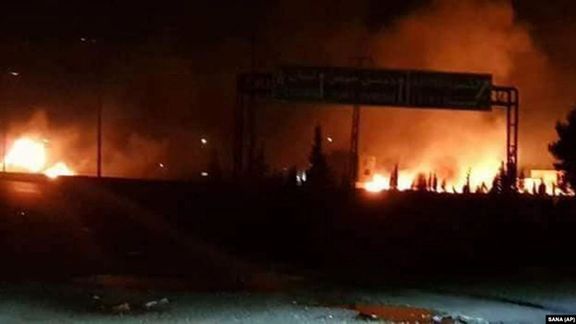
A Syrian airbase reportedly housing Iran-affiliated forces came under air attack just before midnight on Wednesday by what observers say were Israeli planes.
The official Syrian news agency SANA said one Syrian soldier was killed and three wounded in attack. The T4 airbase is located near the city of Palmyra.
The Syrian Observatory for Human Rights, a UK-based war monitor, said the airstrike hit targets controlled by Iranian forces, including the communication tower at the airport. The monitoring group said one Syrian soldier and three Iran-backed fighters were killed and seven others, among them three Syrian soldiers wounded.
It did not identify the nationality of the non-Syrian fighters.
Fars news agency in Iran, affiliated with the Revolutionary Guard (IRGC), reported the attack quoting the Syrian news agency without referring to any Iranian presence in the airport.
Since 2017, Israel has intensified air attacks against Iran-affiliated forces in Syria with hundreds of strikes so far. It rarely acknowledges the attacks but always maintains that it will not allow the Iranian military to entrench itself in Syria and pose a threat to Israel.
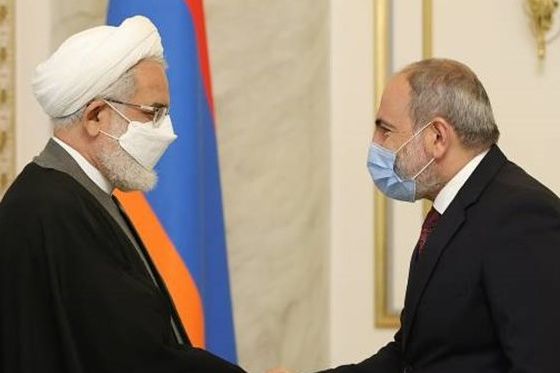
Baku freed two Iranian truck drivers whose arrest exacerbated tensions between the two neighbors that have simmered since last year’s Armenia-Azerbaijan war.
The move on Wednesday came a day after Iranian foreign minister Hossein Amir-Abdollahian spoke by phone with his Azerbaijani counterpart, Jeyhun Bayramov.
In a statement Wednesday, the Azeri foreign ministry said the two sides had agreed that recent " harmful rhetoric" did not reflect friendly bilateral relations. It stressed that disputes over transit roads should be discussed "directly by relevant government agencies," with the two ministers agreeing “the importance of alwaysrespecting the principles of territorial integrity and sovereignty.”
The Iranian foreign ministry reported Tuesday evening that Amir-Abdollahian had underlined that Tehran expected a resolution to the problem regarding transit routes. The ministry's website said Amir-Abdollahian had told his Azerbaijani counterpart that the two sides should not "allow enemies to disrupt" their mutual relations and that Bayramov had agreed to pursue the release of the truck drivers. The report said Amir-Abdollahian and Bayramov had agreed to visit each other.
Baku has restricted Iranian access to Armenia along roads it captured from Armenian forces last year, but Iran-Azerbaijan relations have been strained since the war, which deepened Tehran’s concern over the alleged presence of Israel and of jihadist militia recruited in Syria by Turkey close to Iran’s borders.
Since the arrest of Iranian truck drivers, officials and media in both countries have leveled harsh criticisms in strong language. Iran held extensive military drills near the border area after recent joint military drills between Turkey, Azerbaijan and Pakistan.
Iran’s Supreme Leader Ali Khamenei in a speech on 3 October warned about Israel's military presence in Azerbaijan and said regional countries should not allow foreign armies to interfere. He appeared to also accuse Turkey, an Azeri ally, of encouraging a standoff between Iran and Azerbaijan
Tehran is also seeking to bolster relations with Armenia, generally considered the loser in last year’s war. On three-day visit to Yerevan, Iran's Prosecutor-General Mohammad-Jafar Montazeri met Wednesday with Armenian Prime Minister Nikol Pashinyan, whose office in a statementsaid relations between Tehran and Yerevan were a "good base to resist all the challenges existing in the region.”
Iran's official news agency IRNA reported that Pashinyan had stressed the importance of implementing recent agreements reached with Iran's President Ebrahim Raisi (Raeesi) in Tashkent over renewing gas and electricity exchanges.
Some politicians and media in Iran have suggested a military pact with Armenia.
In a commentary headlined "Calm the turbulence north of Aras [River] with an Iranian military base" October 3, Javan newspaper strongly criticized Baku, for what it said was collaboration with Israel, and Ankara for alleged expansionist plans. The newspaper, which is affiliated to the Revolutionary Guards, suggested building an Iranian military base in Armenia's Syunik Province to guard against geopolitical changes.
"It appears that this would be a better way than continual military drills south of the Aras river," the commentary noted. The Aras divides Iran from Azerbaijan.
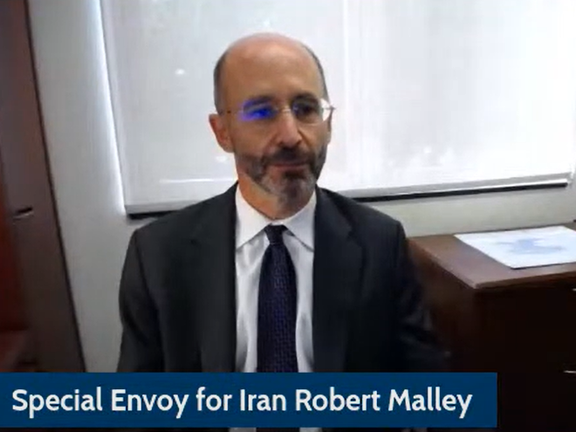
Rob Malley, the US special envoy for Iran, said Wednesday there had been “too much focus on the date” for resuming the Vienna nuclear talks with Tehran.
Malley said that the real issue was whether Iran had “a realistic view on how to come back into compliance with the deal.” Malley's statement about too much focus on the date for resumption of the talks comes as both top US officials, such as Secretary of State Antony Blinken, and European powers have in recent weeks emphasized that time is running out.
At the same time, he also used a tougher tone, reiterating that the US is ready to consider “all options” if Iran were not willing to return to the constraints of the 2015 nuclear deal.
Vienna talks between Iran and world powers, which began in April, was initially suspended since June pending transition to a new administration in Tehran after presidential election won by Ebrahim Raisi (Raeesi). But more than two months after the hardliner took office Tehran has not announced when it would return to Vienna.
In an interview with the Carnegie Endowment for International Peace, Malley stressed the benefits of reviving the 2015 deal − the JCPOA, Joint Comprehensive Plan of Action − while extolling the Biden administration’s cooperation with Israel and the Arab Gulf states, who opposed the deal.
Malley called the decision of former president Donald Trump to leave the JCPOA in 2018 “catastrophic.” He said that Iran’s steps in expanding its nuclear program since 2019 were ones “you could all reverse,” even if expansion would at some point be “irreversible.”
Calm things down
The envoy said a possible “longer and stronger” agreement with Iran could follow a revived JCPOA: “They [Iran] would like to get something more than the JCPOA…The best way forward is to get back to the JCPOA and then discuss ways of strengthening it and dealing with issues that remain very divisive between Iran and the United States. We think this would be to our mutual benefit, there are still things that Iran still wants in terms of sanctions and things that we still want…Let’s get back to the JCPOA to calm things down.”
Rather than expressing any toughening of the US position Malley said the Vienna talks accepted the JCPOA focus on Tehran’s atomic program: “That remains the equation, the equilibrium that remains on the table.”
The critics of the Biden administration’s Iran policy say that if the JCPOA is restored, without additional agreements and sanctions are lifted, Iran would have little incentive to discuss more restrictions on its nuclear, ballistic missiles or regional policies. Most JCPOA limits on Tehran’s nuclear activities will expire in a few years and then it could pursue a much expansive program.
Malley also said that the fate of four Americans jailed in Iran was “separate and apart” from the nuclear talks, on a “separate track.”
Discussions with Iran over the detainees were indirect, the envoy said, just like US participation in Vienna, where talks are based on JCPOA structures, which the US left under Trump. Malley conceded he found this frustrating.
“The Iranian refused direct communications, direct contact with us…[which] lends itself to misunderstandings, to delays…the negotiations would have been more effective had we been able to talk to the Iranians directly.”
But Malley insisted the Biden administration had offered confidence-building measures, and that all parties − Europe, Russia, China “and the Iranian negotiators themselves” – acknowledged “real progress” in Vienna. Malley said Washington continued to tell China that a revived JCPOA would help stabilize a region from which Beijing imported most of its oil.
A different path
Malley said it remained to be seen what path would be taken by a new Iranian administration “clearly stating that it wants to do things differently … [and] every day is making statements about how little was achieved” in Vienna.
“The Biden administration put on the table ideas which meant if Iran had negotiated, and reached this understanding, then sanctions…inconsistent with the JCPOA would have been lifted, and lifted very quickly,” he said. “That’s the choice Iran faces today: are they prepared to go back, or do they want to choose a different path?”
Malley said that close coordination with Israel and the Arab Gulf states − with the Saudi, Israeli and Emirati foreign ministers currently in Washington – recognized their “real reservations about the nuclear deal” and that Trump’s withdrawal had been “celebrated quite strongly in Israel.”
But Malley suggested that four rounds of Saudi-Iran talks and a “lively debate in Israel” were both positive developments.
“We will be prepared to adjust to a different reality in which we have to deal with all options to address Iran's nuclear program if it's not prepared to come back into the constraints [of the JCPOA],” he said.